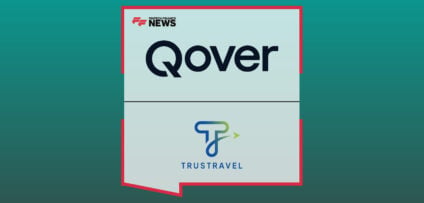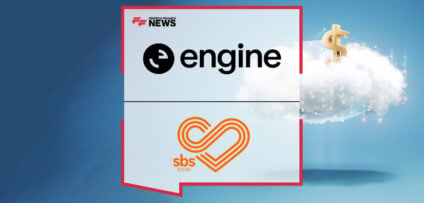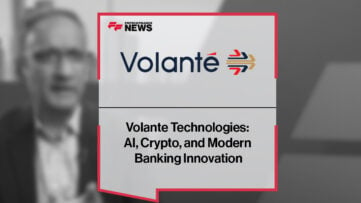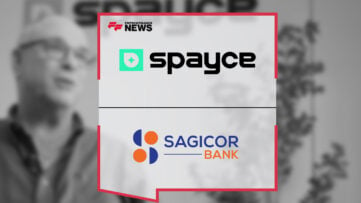Breaking News
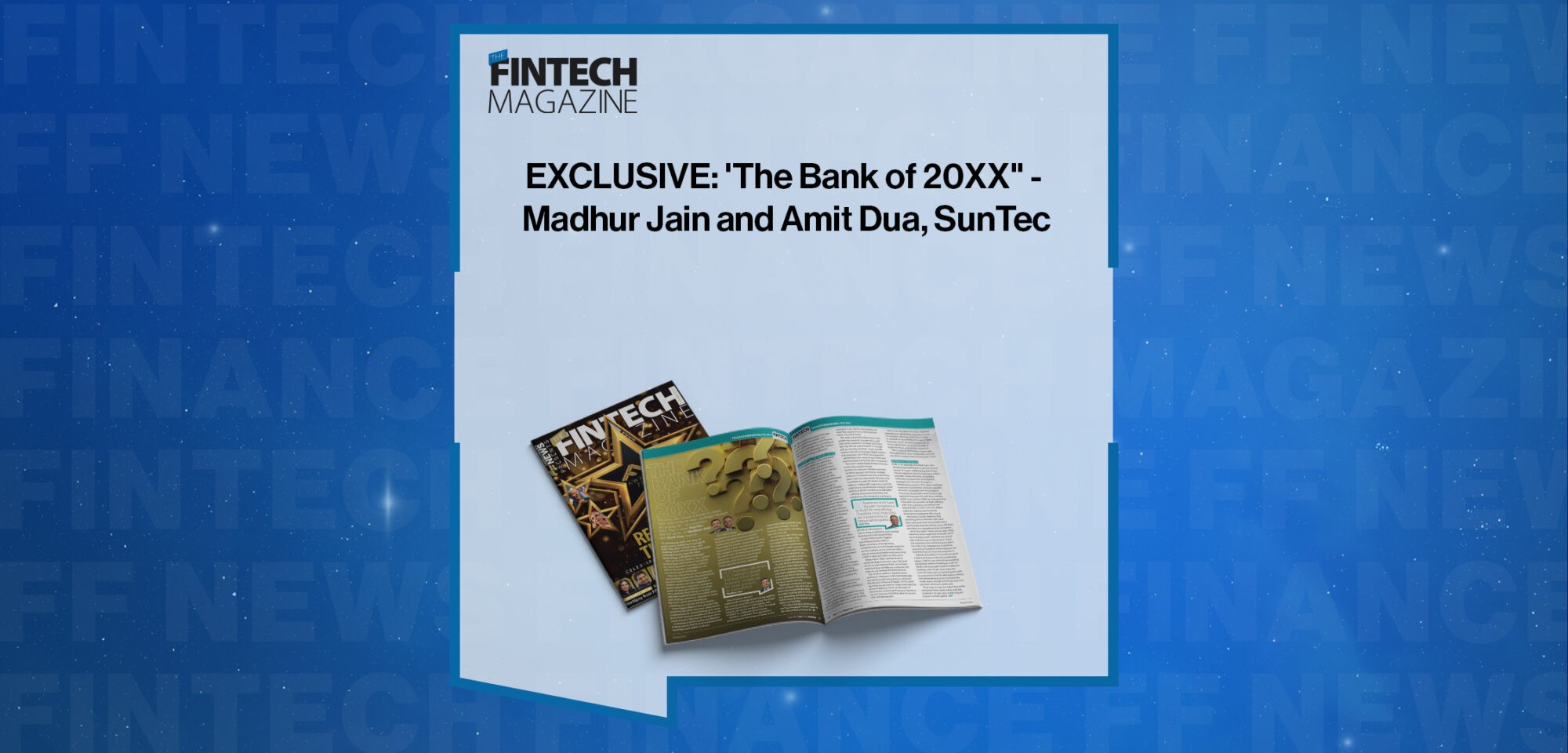
EXCLUSIVE: ‘The Bank of 20XX” – Madhur Jain and Amit Dua, SunTec in ‘The Fintech Magazine’
Whatever the shape of banks to come, they need to know their strategic choices are paying off – at a granular level. That’s what SunTec can tell them, as Madhur Jain and Amit Dua explain
“If somebody tells me that, in eight years, banking is going to look ‘like this’, I think they are making fools of everyone, because nobody knows exactly how technology will drive change.”
Wise words from Madhur Jain, global head of SaaS and Solution Consulting for SunTec Business Solutions, whose view is that banks, nevertheless, are at a pivotal point of change. They can choose to be commoditised, and probably eventually disenfranchised, by more nimble fintech players with modern systems and the capability to better meet their customers’ changing needs.
Or they can embrace a strategy of co-opetition by bolting on fintech offerings to build loyalty and wallet share with existing customers, and attract more like them, while also developing a banking-as-a-service income stream. Some bigger players have already fully embraced the latter, because, while banks in general are on sound footing now, they know their revenue models are likely to be sorely tested in the near to medium term.
As Deloitte’s 2024 Capital and Markets Outlook puts it, they’ll need to demonstrate ‘conviction and agility’ to thrive.
As a relationshipbased pricing and billing specialist, SunTec Business Solutions is concerned with making this new-look model stack up financially for a bank. Using its proprietary approach to value-centred customisation, the company aims to help banks achieve the sweet spot of satisfying individual consumer requirements and doing so profitably, even as the technology landscape around them changes.
The company doesn’t make itself a hostage to fortune by spelling out exactly how that will change the shape of banking or when it will happen. But what it can say for certain is that ‘The Bank of 20XX’ is a different kind of beast.
SunTec‘s customer-first approach is predicated on ‘exchange of value’ in the supply chain, helping providers to both please their customers – retail and business – and transform that satisfaction into cold, hard cash. Its technology helps clients to create ‘segments of one’, based on deep knowledge of the customer and, effectively, create a supermarket for all that customer’s needs, not just their financial ones.
That requires commitment to becoming ‘lifestyle partners’ and a complete reorganisation around the customer’s unique requirements. So, how do they drive greater value out of every single relationship in this way?
Overcoming legacy systems’ constraints, adopting cutting-edge technologies like AI, and fostering a data-driven culture are the stepping stones to success, says Jain.
“Providers talk about being ‘customer first’ but most banks’ business models are far more productor internal-first”
“Banking is moving far more towards what a customer’s life cycle events are, and, to be successful in that world, providers need the ability to work around new technology and platforms to deliver what’s important to customers with agility and flexibility.
“Providers talk about being ‘customer first’ but most banks’ business models are far more product-or internal first.
“We manage and measure how value is exchanged across complex value chains, between providers and consumer, bearing in mind these roles can change at different points, by keeping the customer or stakeholder always at the heart.”
A SHARE IN THE VALUE CHAIN
SunTec’s philosophy is that every player in the chain needs to be adequately rewarded for their contribution if the ecosystem is to flourish and achieve a frictionless experience for the customer, resulting in deeper, stronger, more rewarding relationships for the bank.
One example of how relationship-based pricing helps banks make money from more customer-centric strategies is carbon-neutral banking. SunTec provides the technology for banks to offer products both direct to customers and as a BaaS option, allowing participants to both contribute to climate change mitigation efforts and generate additional revenue by maximising value in the product chain. Much of SunTec’s recent work stemmed from demand created during the pandemic.
Amit Dua, president of SunTec Business Solutions, based in London, explains: “A number of the banks we have helped found their customers asking for better transparency and control as the pandemic made them more aware of their financial situations. So we used our technology to help banks offer a more holistic view when a customer logs in, showing which products and services they are already subscribed to and their eligibility for others. If they pick and drop other products into their existing relationship with the bank, like an Amazon basket experience, we show them how that affects their current pricing.
“If they have a savings account, for example, and are scouring for a mortgage product, and the bank offers them a better price by assimilating the whole thing, they are likely to stop looking elsewhere and so the bank wins by increasing the size of the wallet.”
HSBC and Bank of America are among a number of bigger players that have recognised the value in building products around their customers.
Allison Shonerd, Bank of America’s head of global digital disbursements, says: “The pace of change makes this a really exciting time and the key for us is staying very grounded in our clients, their needs and what they require from us, having them inform our way forward.
“We really enjoy being able to test and explore new proof of concept ideas, and many of the solutions I manage were born that way, like our use of Interac in Canada and our recently-launched hook-up with Venmo in the US, to leverage digital wallets that customers use in their everyday lives – all born from the voices of our client and experimentation we kicked off in response.”
The bank’s Global Digital Disbursements, its new alias request-to-pay business-to-consumer solution over the Canadian payment rail Interac, enables customers to choose how they want to be paid. It was launched earlier this year and is available through the bank’s CashPro platform. It allows B2C payments and C2B collections to be processed using an email address or phone number as an identifier – offering more speed, flexibility and transparency for companies wanting to provide an alternative to cash or cheque payments and manage their payment and receipt flows.
As one of the world’s biggest international banks, HSBC is hyper-conscious of the growing competition for its cross-border business account holders, so it’s come up with a way of cementing loyalty and preventing a drift to other providers as they grow.
Nadya Hijazi, HSBC’s global head of wholesale digital channels, says: “Because we are an international bank, we’ve been looking at how we help our customers be what we call ‘confidently international’.
“Businesses don’t have the core competency to build for everything. Therefore most industries are transitioning to horizontal integration “
“For small or medium-sized business customers, starting to trade internationally and working with companies in countries like Vietnam, China and Egypt, can be quite daunting. So we want to make international account opening easier, as the start of the journey towards getting your business up and running and being able to receive cash and pay people.
“We’ve recently gone live with a digitised international onboarding experience across 20 countries, allowing customers to open an account in one of those through a digital front end, which we prepopulate with as much information as we can to make it easier for them, and using e-signatures.
“We’ve seen an immediate impact with 500 applications since September and a 50 per cent increase in our net promoter score.”
BANKING ON BaaS
HSBC is an example of a bank that’s also developing a banking-as-a-service revenue stream. It’s been collaborating with major Cloud enterprise resource planning system provider, Oracle NetSuite, to facilitate international payments and expense management services through its SuiteBanking solution.
This allows NetSuite customers to automate accounts payable, accounts receivable and reconciliation processes, to pay bills, send invoices, get paid and maintain full cash flow visibility within one system. HSBC has indicated that it has plans to broaden its BaaS offering with more solutions, including HSBC Global Wallet, a multi-currency digital wallet for making and receiving international payments like a local.
Ultimately, SunTec believes that providing end-customers with what they want and need necessitates close partnership between banks, techs and BaaS providers in a complementary ecosystem.
Amit Dua adds: “Gone are the days when industries were organised vertically and if you manufactured a product you would take it all the way to distribution. That’s not expected now and businesses don’t have the core competency to build for everything. Therefore most industries are transitioning to horizontal integration.”
Indeed, according to a recent survey of 1,000 businesses in the UK and Benelux region, half (51 per cent) of non-banking businesses believe banking as a service (BaaS) will eventually replace traditional banking, with 56 per cent citing the cost-of-living crisis as hastening this shift as consumers look for alternatives among non-financial brands for products like credit, loans, foreign exchange, buy now, pay later and even credit card.
That may or may not mean that banks relinquish their relationship with the customer. As Jain says, predicting the future is a fool’s game
This article was published in The Fintech Magazine Issue 30, Page 17-18
People In This Post
- DIFC’s Dubai FinTech Summit Expands Globally with Pakistan Digital Authority Read more
- GoldenPeaks Capital Secures Largest PPA Deal in Hungary With Hankook Read more
- Volante Technologies: AI, Crypto, and Modern Banking Innovation Read more
- Payment Spayce and Sagicor Bank: Innovating Fintech for the Caribbean Market Read more
- Top Companies Supporting Former Workers with German Pension Refunds Read more












